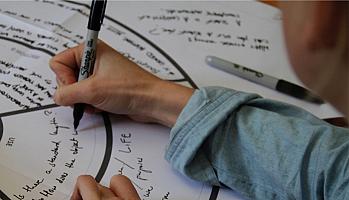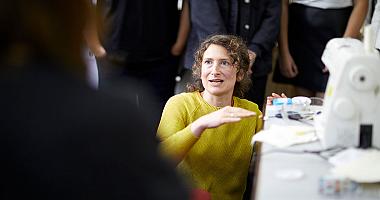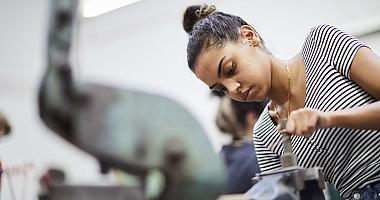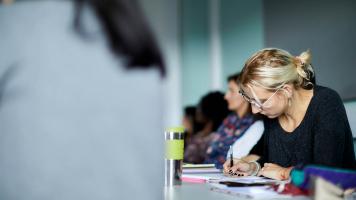MA
Design: Expanded Practice
Content navigation menu
Why study MA Design: Expanded Practice at Goldsmiths
This is a radical post-disciplinary programme for practitioners who want to push the boundaries of what design can be and do.
- During the Masters we work with you to transform your practice as a critical and social undertaking.
- By challenging the role and norms of traditional design towards an emerging type of ‘advanced design’, unshackled from the history of specialisms and entrenched methods, you will become part of a community of practice. You'll be encouraged to actively contribute to a deep understanding of how design is set to address and affect change within contemporary society.
- Whatever your background or previous degree we expect you to examine your own practice. This might be in a traditional field of design such as graphic design, product design, fashion design or interior design. Other fields such as teaching, social science, humanities, curating, engineering, science and business are also considered practices and are welcomed on the programme.
- The MA is structured around thematic areas of investigation (Studios) which situates you – the practitioner – in a particular field of study and reference. You can find out more about these Studios in the section below.
Contact the department
If you have specific questions about the degree, contact the Department of Design.
Please note: this programme is now almost full for 2024 entry. You are still welcome to apply for 2024 – if we are not able to consider you for 2024 we will hold your application for 2025 entry. If we are considering you for 2025 you will not receive a decision until the autumn
Studio structure
The Studio offering will be tailored each year to the skills/expertise of applicants and in response to the changing nature of the design field and the world around us. Studios for 2024/25 are:
- Communication & Experience
- Fashions & Embodiment
- Speculation & Techniques
- Interactions & Experiments
- Spaces & Participation
- Culture & Ecologies
The Studios take a post-disciplinary approach to practice, where tools, techniques, media and methods are appropriated and adopted in response to the demands of a project. The Studios will help build collaborative and material skills through project- based learning where collective investigation is carried out alongside both faculty and visiting experts.
Each Studio is encouraged to build an identity within the programme – supporting diverse practice, building a rich identity, and attracting a broad range of applicants.
What you'll study
The programme runs for 15 months over five 10-11 week terms and is full-time (this means a minimum of 4 days per week). It is largely delivered through project briefs (both working in groups and individually), which allows an experimental and exploratory design process.
The projects open up opportunities for you to work collectively on research projects, external industry briefs and wider design research themes. Through this process, you'll evolve a design practice that is progressive but also thoughtful, critical and grounded in the complex realities of the world.
Throughout your projects you'll benefit from the input of experienced practice-based staff, as well as world-class visiting practitioners.
These projects are all part of three interconnected modules that make up the MA Design Expanded Practice programme:
| Module title | Credits |
|---|---|
| Studio Expanded Practice | 120 credits |
| Design Transfocality | 60 credits |
| Extended Study | 30 credits |
For Studio Expanded Practice in the first term you will also respond to a shared project brief supported by wide range of design staff from the department and guest speakers. This initial project will be run across the whole Masters programme, to build your practice working alongside and in collaboration with the diverse cohort of design students. This will be a combination of scheduled sessions (lectures, workshops, tutorials) as well as self-directed studio or fieldwork amounting to 3 days per week.
In addition to this project you will choose to situate yourself within a Studio, and spend one day a week in your Studio of choice, where you will be exploring discourses through talks and seminars, engaging with methods and processes appropriate to the studio's focus. This will give you a body of knowledge that will equip you to act in design in your area of interest and continue as weekly session throughout terms 1, 2 and 3.
In terms 2 and 3 (Design Transfocality) you will be selecting a project from a choice of three each term. Each of these projects will be made up of students from all of the Studios. The aim is to bring your interests to the particular project to shape it for the development of your own practice.
In term 4 (summer) you will select an externally focused project (Extended Study), like our annual summer school in Paris (eg Design and Performance), or a placement with an external organisation.
You return to Goldsmiths for term 5 to pull together your body of work and concluding design outcomes (culmination of Studio Expanded Practice) for public engagement through various public facing platforms (eg publication, exhibition, symposium).
Teaching
The activity for the MA will operate across both the main New Cross campus and our satellite campus, currently in Deptford (a 10-minute walk from Goldsmiths).
How you'll be assessed
Formative assessment will take place through regular tutorials, critique sessions and project presentations. Formative assessment allows students to reflect on their progress and decide areas for focus and/or improvement. Formative assessment and feedback will be facilitated by a range of department staff, as well as through peer review and inter-Studio discussion.
Studio overview
You should motivate your application through a first and second choice from this set of Studios:
Communication & Experience
This Studio focuses on investigation and communication, acknowledging a clear interdependency between 'content' (that being investigated) and 'container' (the exploration of the means of communication). Following a process of critical engagement with socio-cultural-political-curatorial concerns, we encourage the exploration of new formats and languages of communication using all means and media, through an interplay of space, performance, objects, film, sound, gaming, activism, language etc. The work we support seeks to engage with the public – not as an audience, but as co-respondents, co-authors and co-conspirators.
Fashions & Embodiment
This Studio facilitates conversations between making and unmaking, global and local, ethics and aesthetics, object and system, bodies and clothes. We challenge accepted boundaries and perceptions to explore fashion as a mode of collective agency. This requires questioning the relationship between fashion and consumption and generating knowledge and approaches that foster the transformative capacities of fashion and dress. We aim to broaden and reposition fashion practice through rethinking the relationships between garment, image, text, body and context to explore innovative ways of thinking, making and doing fashion.
Speculation & Techniques
This Studio investigates ways in which we can understand our history, present and future through temporal entwinement encompassing products, technologies, infrastructures and architectures. The Studio's mission is to understand how these entities can be understood and contrived through process, method, practice and ‘ways of doing’. In this studio, ‘Speculation’ is understood as a fundamental act present in all forms of practice. It is an investigation of ‘what might be,’ drawing directly from other practice-based disciplines such as literature and film, but including the approaches of performance, theatre, music etc.
We acknowledge but are not limited by ‘speculative’ as a genre of design. We embrace speculation broadly as an active state that can be inclusive, and participatory and has impact and potential beyond what is understood as ‘speculative design’. In short, we will be looking at the techniques, processes and approaches that can activate speculation expansively, inclusively, experimentally and playfully to further understand what these approaches can achieve as reflective and provocative possibilities for pioneering practice.
Interactions & Experiments
This Studio explores inventive approaches to design and design-led research. We understand that the doing of design is connected to the making of the social world. We develop experiments that explore the interconnectedness of the designed social world, focusing on interactions between people and non-humans, such as technologies, infrastructures, policies and animals. We then work within these interconnected relationships to develop new interactions through material responses, and through this bring about new approaches to designing. To support this, we draw on material from design research and science and technology studies (STS). We activate our ideas in collaboration with specialists and in response to practical activities, field trips, seminars and workshops.
Spaces & Participation
This Studio looks at design as a situated practice that can activate and transform complex sociopolitical networks. Making use of intersectional and post-colonial theories, in combination with hands-on methods and practices (counter mapping, activism, public engagement, film, installation, sound and performance), we address the structural inequalities intrinsic to the production of everyday life.
From the personal and intimate to the urban and planetary, we embrace the complexities of contested spaces and identities, which are often hidden behind the polarising rhetoric of efficiency, growth and control, to question dominant forms of power and imagine and practice alternative modes of making ‘the collective’.
By colliding historical movements with contemporary practices we understand that ‘public’ space is never neutral and that design must account for future multi-entangled generations if it is to contribute to the ‘psychosocial’ wellbeing of the people who inhabit it.
Culture & Ecologies
This Studio considers the role of design (as both an outcome and a practice) in the formation of cultures, or ‘worlds’. Considering ‘ecologies’ as the messy collections of – and interdependencies between – matter, artefacts, and species grounded in particular spaces and timeframes, the studio supports designers to critically reevaluate the socio-cultural-material systems of which we are a part.
Through the facilitation of interventions, events, adjustments, research and workshops, the studio fosters practitioners' ‘response-ability’, allowing for practical engagement with questions concerning design’s ethical responsibilities to the planet, environments, and cultures (both human and non-human). These responsibilities are seen not as barriers, or things to be ‘overcome’ or ‘solved’, but rather departure points.
The Studio expands design into its wider fields of consequence and embraces alternative forms of knowledge production and radical creative practice.
Careers
Graduates of the MA Design Expanded Practice can expect to enter a wide range of careers. You'll be equipped with the necessary expertise to develop a personal professional practice where you can expect to operate in roles such as:
- Individual designer/researcher
- Designer/maker
- Creative technologist/practitioner
- Freelance consultant
You may decide to develop and manage your own business, creative studio or design projects after graduation.
You could also get involved in researching or designing for an organisation, entering into journalism or writing, or progressing further in academia.
Another benefit of the Masters is that during the programme you'll build creative relationships and networks beyond Goldsmiths, which could prove useful for future collaborations or professional opportunities.
Skills
Some of the skills you'll develop during the Masters include:
- The ability to creatively and critically engage in debates relating to contemporary design culture
- The ability to conduct design research
- The ability to produce designed outcomes
- Creativity
- Initiative and invention
- The ability to question and critique theoretical perspectives
- Entrepreneurial skills
- Practical and technical design-making skills
- Communication skills
- Planning and organisation
- Teamwork
- Leadership
- Networking skills
Entry requirements
You should have (or expect to be awarded) an undergraduate degree of at least upper second class in a relevant/related subject.
If you don't have a related undergraduate degree we also welcome those who have significant practical experience in a design-related field: you will be judged on the relevance of your previous work experience and on your art and/or design work. We will also consider applicants who do not have a design-related background but who have engaged in research either in academia (as students or academics) or at work.
We expect a high standard of achievement in design or other creative practice, and competencies in the use of equipment used to produce design work (IT and/or manufacture workshop skills).
You need to present, in portfolio and at interview, evidence of evolved critical and creative thinking in design.
International qualifications
We accept a wide range of international qualifications. Find out more about the qualifications we accept from around the world.
If English isn’t your first language, you will need an IELTS score (or equivalent English language qualification) of 6.5 with a 6.5 in writing and no element lower than 6.0 to study this programme. If you need assistance with your English language, we offer a range of courses that can help prepare you for postgraduate study.
How to apply
For the MA Design: Expanded Practice, you apply directly to Goldsmiths using our online application system.
To complete your application, you will need to have:
- Details of your academic qualifications
- The email address of your referee who we can request a reference from, or alternatively a copy of your academic reference
- Copies of your educational transcripts or certificates
- A portfolio (see below)
- A completed application brief (Word)
Portfolio
Applicants with a design background
Your portfolio should show five relevant projects (including sketches, process, experiments, and iterations), and include a short piece of writing in which you explain and reflect on your selection (500-1,000 words). Please upload this as a single PDF titled ‘Portfolio’. You will additionally need to complete and upload the Application brief (Word).
Applicants with a non-design background
Please submit a short piece of writing (500-1,000 words) on a topic relevant to the programme (use this as an opportunity to articulate your views on topics that align with your chosen studio), and a 10-page visual document related to this topic. Your visual document will provide a platform for inventive, insightful, and idiosyncratic treatments of your chosen topic. These should be titled ‘Writing Example’ and ‘Visual Document’. You will additionally need to complete and upload the Application brief (Word).
Personal statement
Please complete the personal statement template in our online application system. You must complete these specific sections during the application process – please do not upload a general document in the personal statement section. The sections are as follows:
- Intellectual rationale for choosing your programme (MA Design: Expanded Practice)
- Previous academic background in relation to your programme choice
- Other experience that contributes to your programme choice
- What are your long-term academic goals and how will this programme help you achieve these?
- Any other information you feel to be relevant?
You'll be able to save your progress at any point and return to your application by logging in using your username/email and password.
When to apply
We will consider applications received before the end of February 2024. After this date, applications will only be considered if there are spaces remaining on the programme. As the programme attracts a very large number of applicants, we may be unable to provide feedback on your application if it arrives after the deadline.
Selection and interview process
There are no places offered on the programme via application alone. Selected applicants will be invited to interview once their application has been assessed. Interviews will usually take place on campus, but online interviews will be offered to overseas applicants.
During the interview you will asked the following questions:
- What is your educational/professional background and how has this shaped your current practice?
- What are your expectations/what do you want to achieve through the MA Design: Expanded Practice?
- Why/how do you think the unique approach and structure of this programme at Goldsmiths particularly aligns with your future goals/aspirations?
- If accepted onto the programme, which Studio would you like to join? Please tell us your first and second preference
You will also have the opportunity to present a portfolio of work that may include a range of material including sketchbooks, and samples of written assignments. The interview is an opportunity to have a conversation about Studio preferences and your portfolio, and meet some of the staff working on the programme.
Please remember that the interview is between yourself and the tutor – you should not have anyone else present with you during the interview.
Find out more about applying.
A team of students from the Masters were invited to South Korea for the Gwangju Design Biennale 2019. From receiving funding to setting up, they reflect on the experience of exhibiting at an international design show.
Fees and funding
Annual tuition fees
These are the PG fees for students starting their programme in the 2024/2025 academic year.
If your fees are not listed here, please check our postgraduate fees guidance or contact the Fees Office, who can also advise you about how to pay your fees.
It’s not currently possible for international students to study part-time under a student visa. If you think you might be eligible to study part-time while being on another visa type, please contact our Admissions Team for more information.
If you are looking to pay your fees please see our guide to making a payment.
Funding opportunities
Explore the Goldsmiths scholarships finder to find out what funding you may be eligible for.
If you are a UK student you may be eligible for a postgraduate loan.
Meanwhile our Careers Service can also offer advice on finding work during your studies.
Paying your fees
Please note that as the MA Design: Expanded Practice is a 15-month programme. This will have implications for paying your fees if you are applying for a postgraduate loan to help fund your studies. The postgraduate loan instalments will be spread over a period of two years, with the final two loan instalments being paid after you complete your studies.
If you are planning to use the postgraduate loan to help pay your fees, you need to be aware that all tuition fees will need to either be paid at enrolment in September when you start your programme or via direct debit instalments, but these instalments will not be aligned with your loan. The full fee value will be due by the end of the third term (July) of the programme, prior to payment of the second year of postgraduate loan payments. Find out more about paying your tuition fees.
Additional costs
In addition to your tuition fees, you'll be responsible for any additional costs associated with your course, such as buying stationery and paying for photocopying. You can find out more about what you need to budget for on our study costs page.
There may also be specific additional costs associated with your programme. This can include things like paying for field trips or specialist materials for your assignments. Please check the programme specification for more information.





